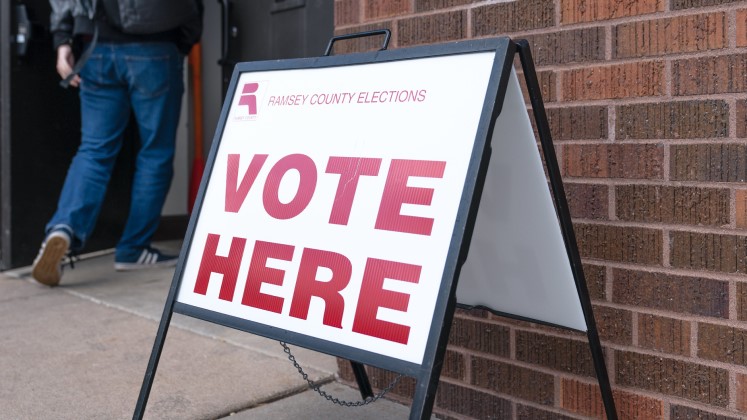
 In most parts of the US, non-citizens are prohibited from voting. But do these restrictions on non-citizen voting reflect public opinion in the US? In new research Hannah Alarian and Stephanie Zonszein examine the impact of partisanship on views about non-citizens voting. Using survey research, they find that American partisans are pragmatic – they are more likely to support voting rights for non-citizens who support the same political party as they do. Contrary to messaging from politicians, they also find that this applies to both Republicans and Democrats.
In most parts of the US, non-citizens are prohibited from voting. But do these restrictions on non-citizen voting reflect public opinion in the US? In new research Hannah Alarian and Stephanie Zonszein examine the impact of partisanship on views about non-citizens voting. Using survey research, they find that American partisans are pragmatic – they are more likely to support voting rights for non-citizens who support the same political party as they do. Contrary to messaging from politicians, they also find that this applies to both Republicans and Democrats.
Should non-citizens be allowed to vote in local elections? This question is one of the most contested issues in contemporary US politics, especially in cities that have recently enfranchised non-citizens. Debates among politicians and policymakers are deeply polarized along partisan lines: Republicans argue non-citizens should not be allowed to vote, while Democrats contend that expanding local voting rights strengthens democracy.
Still, American public opinion on non-citizen voting rights is not well understood. Some research suggests that American attitudes would follow similar patterns, as partisanship is a fundamental component of voter attitudes, with immigration at the core of this divide.
Our research shows that American attitudes toward voting rights are more pragmatic. Instead of universally approving or rejecting non-citizen voting rights, partisans consider how non-citizens would vote.
Non-Citizen voting rights in the United States
Non-citizen voting has a long history in the United States. For most of the US’ history, non-citizens could legally vote. In fact, non-citizens voted legally in every presidential election until 1925––with states restricting voting rights to citizens only by 1928.
However, nearly a century after it was taken away, many areas across the US are returning the right to vote to non-citizens within local elections. Today, as Figure 1 shows, 19 localities currently allow immigrants without citizenship the right to vote in local and/or school board elections. Other states, however, have moved in the opposite direction: prohibiting non-citizens from participating in any election within the state.
Figure 1 – Map of voting rights and restrictions within the US

Public opinion is important because public referendums are often used to decide whether non-citizens are enfranchised or barred. This fall, Santa Ana, California residents will vote on enfranchising resident non-citizens in city elections. In contrast, those in North Carolina will vote on prohibiting non-citizens from voting anywhere within the state.
Partisanship and support for non-citizen voting
We expect partisanship to condition American attitudes toward non-citizen voting rights. Partisanship is among the most important predictors of American voter behavior and opinion. It shapes how we view ourselves, evaluate others, and vote. We argue that Americans will be more likely to support suffrage for those who would support the same political party as they do and be against enfranchising those who may vote for the party the oppose.
Research shows that enfranchisement is an opportunity to increase a party’s influence. Globally, other populations—including women and emigrants—are more likely to receive the right to vote when they are thought to support the party in power. In the US, Republicans are also less likely to support Puerto Rican migration to the mainland when they are made aware of their eligibility to vote and their preference for Democratic candidates.

“210828 – voting rights-6” (CC BY 2.0) by Johnny Silvercloud
Our study examined partisanship’s effect on American public opinion, asking whether Americans shift their support for enfranchisement when it may benefit their party or partisan identity. We answered this question using two survey experimental studies, where we randomly assigned participants to view a brief vignette mimicking a news story about non-citizen local voting rights in the US One-third of the participants did not receive any information about non-citizen vote choice, one-third read that many non-citizens would vote for their own party, and one-third read that many non-citizens would vote for the opposite party.
The first survey experiment included a random sample of registered Florida voters using Florida’s public voter registration file. We selected Florida because of its diverse immigrant population, making it a particularly important case.
Our second study expanded our sample nationally, using the same experiment on a sample recruited through CloudResearch. This second study was essential to ensure that any findings observed in the first study were present throughout the US
Support for voting rights is conditional on who non-citizens are thought to vote for
Both experiments reveal that American partisans are pragmatic. As Figure 2 illustrates, American voters are, on average, more likely to support local voting rights when non-citizens are thought to be fellow partisans and less likely to support these same rights when non-citizens are thought to support the party they oppose. Contrary to messaging from party leaders, Republicans are not universally opposed to, and Democrats are not universally supportive of, giving non-citizens the right to vote. Rather, we found nationally that Republicans are more likely to support non-citizen local enfranchisement if these new voters vote Republican. Democrats who learn that many non-citizens may vote Republican, however, are less likely to support non-citizen enfranchisement.
Figure 2 – Support for non-citizen local suffrage by treatment groups

This conditional support demonstrates how partisan interests directly shape democratic processes and the expansion of the electorate. Policy advocates thus face a difficult choice. Highlighting that non-citizens are part of one’s partisan ingroup may improve opinion on (re)enfranchisement for partisan allies. Yet doing so will also significantly diminish support among those who view these non-citizens as partisan opponents.
These implications are pivotal for policymakers and scholars. Currently, expanding the right to vote largely occurs through referendums. If the voters in these referendums conditionally support enfranchising only co-partisans, the outcome in many locations may be to strategically oppose expanding access to the ballot box. Thus, a maximally democratic mechanism—direct democracy through a public referendum—may paradoxically reduce democratic inclusion.
- This article is based on the paper, ‘Conditional Enfranchisement: How Partisanship Determines Support for Noncitizen Voting Rights’, in American Political Science Review.
- Please read our comments policy before commenting.
- Note: This article gives the views of the author, and not the position of USAPP – American Politics and Policy, nor the London School of Economics.
- Shortened URL for this post: https://wp.me/p3I2YF-e1c






